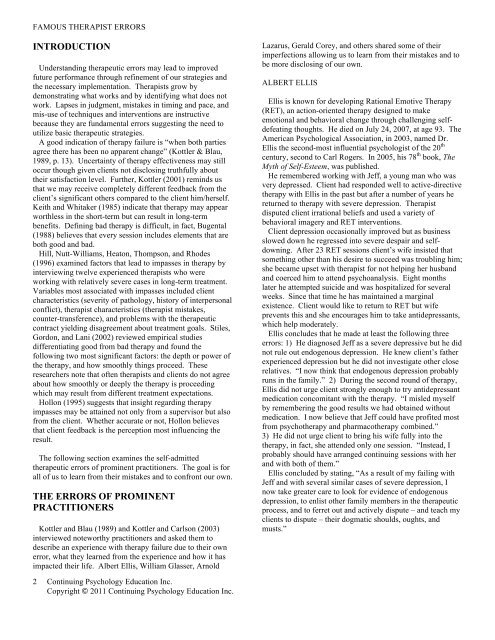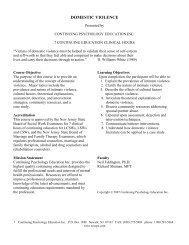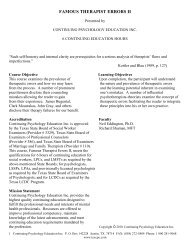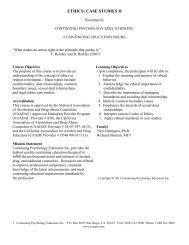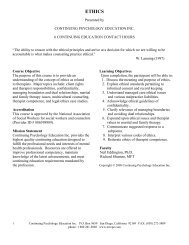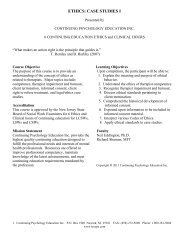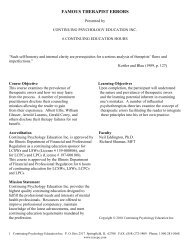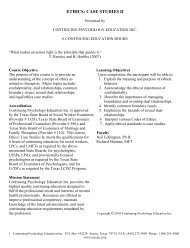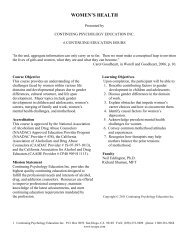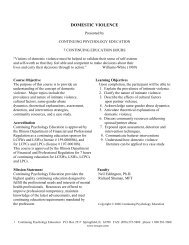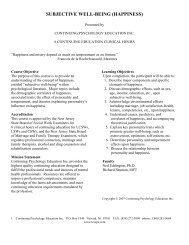FAMOUS THERAPIST ERRORS - Continuing Psychology Education
FAMOUS THERAPIST ERRORS - Continuing Psychology Education
FAMOUS THERAPIST ERRORS - Continuing Psychology Education
Create successful ePaper yourself
Turn your PDF publications into a flip-book with our unique Google optimized e-Paper software.
<strong>FAMOUS</strong> <strong>THERAPIST</strong> <strong>ERRORS</strong>INTRODUCTIONUnderstanding therapeutic errors may lead to improvedfuture performance through refinement of our strategies andthe necessary implementation. Therapists grow bydemonstrating what works and by identifying what does notwork. Lapses in judgment, mistakes in timing and pace, andmis-use of techniques and interventions are instructivebecause they are fundamental errors suggesting the need toutilize basic therapeutic strategies.A good indication of therapy failure is “when both partiesagree there has been no apparent change” (Kottler & Blau,1989, p. 13). Uncertainty of therapy effectiveness may stilloccur though given clients not disclosing truthfully abouttheir satisfaction level. Further, Kottler (2001) reminds usthat we may receive completely different feedback from theclient’s significant others compared to the client him/herself.Keith and Whitaker (1985) indicate that therapy may appearworthless in the short-term but can result in long-termbenefits. Defining bad therapy is difficult, in fact, Bugental(1988) believes that every session includes elements that areboth good and bad.Hill, Nutt-Williams, Heaton, Thompson, and Rhodes(1996) examined factors that lead to impasses in therapy byinterviewing twelve experienced therapists who wereworking with relatively severe cases in long-term treatment.Variables most associated with impasses included clientcharacteristics (severity of pathology, history of interpersonalconflict), therapist characteristics (therapist mistakes,counter-transference), and problems with the therapeuticcontract yielding disagreement about treatment goals. Stiles,Gordon, and Lani (2002) reviewed empirical studiesdifferentiating good from bad therapy and found thefollowing two most significant factors: the depth or power ofthe therapy, and how smoothly things proceed. Theseresearchers note that often therapists and clients do not agreeabout how smoothly or deeply the therapy is proceedingwhich may result from different treatment expectations.Hollon (1995) suggests that insight regarding therapyimpasses may be attained not only from a supervisor but alsofrom the client. Whether accurate or not, Hollon believesthat client feedback is the perception most influencing theresult.The following section examines the self-admittedtherapeutic errors of prominent practitioners. The goal is forall of us to learn from their mistakes and to confront our own.THE <strong>ERRORS</strong> OF PROMINENTPRACTITIONERSKottler and Blau (1989) and Kottler and Carlson (2003)interviewed noteworthy practitioners and asked them todescribe an experience with therapy failure due to their ownerror, what they learned from the experience and how it hasimpacted their life. Albert Ellis, William Glasser, ArnoldLazarus, Gerald Corey, and others shared some of theirimperfections allowing us to learn from their mistakes and tobe more disclosing of our own.ALBERT ELLISEllis is known for developing Rational Emotive Therapy(RET), an action-oriented therapy designed to makeemotional and behavioral change through challenging selfdefeatingthoughts. He died on July 24, 2007, at age 93. TheAmerican Psychological Association, in 2003, named Dr.Ellis the second-most influential psychologist of the 20 thcentury, second to Carl Rogers. In 2005, his 78 th book, TheMyth of Self-Esteem, was published.He remembered working with Jeff, a young man who wasvery depressed. Client had responded well to active-directivetherapy with Ellis in the past but after a number of years hereturned to therapy with severe depression. Therapistdisputed client irrational beliefs and used a variety ofbehavioral imagery and RET interventions.Client depression occasionally improved but as businessslowed down he regressed into severe despair and selfdowning.After 23 RET sessions client’s wife insisted thatsomething other than his desire to succeed was troubling him;she became upset with therapist for not helping her husbandand coerced him to attend psychoanalysis. Eight monthslater he attempted suicide and was hospitalized for severalweeks. Since that time he has maintained a marginalexistence. Client would like to return to RET but wifeprevents this and she encourages him to take antidepressants,which help moderately.Ellis concludes that he made at least the following threeerrors: 1) He diagnosed Jeff as a severe depressive but he didnot rule out endogenous depression. He knew client’s fatherexperienced depression but he did not investigate other closerelatives. “I now think that endogenous depression probablyruns in the family.” 2) During the second round of therapy,Ellis did not urge client strongly enough to try antidepressantmedication concomitant with the therapy. “I misled myselfby remembering the good results we had obtained withoutmedication. I now believe that Jeff could have profited mostfrom psychotherapy and pharmacotherapy combined.”3) He did not urge client to bring his wife fully into thetherapy, in fact, she attended only one session. “Instead, Iprobably should have arranged continuing sessions with herand with both of them.”Ellis concluded by stating, “As a result of my failing withJeff and with several similar cases of severe depression, Inow take greater care to look for evidence of endogenousdepression, to enlist other family members in the therapeuticprocess, and to ferret out and actively dispute – and teach myclients to dispute – their dogmatic shoulds, oughts, andmusts.”2 <strong>Continuing</strong> <strong>Psychology</strong> <strong>Education</strong> Inc.Copyright © 2011 <strong>Continuing</strong> <strong>Psychology</strong> <strong>Education</strong> Inc.


